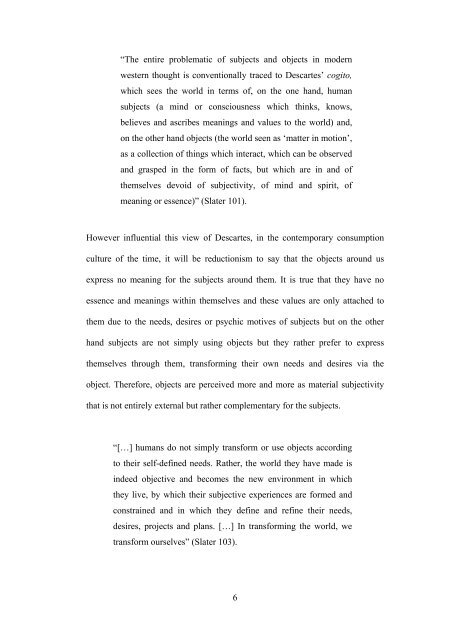virtualization of design and production a thesis - Bilkent University
virtualization of design and production a thesis - Bilkent University
virtualization of design and production a thesis - Bilkent University
You also want an ePaper? Increase the reach of your titles
YUMPU automatically turns print PDFs into web optimized ePapers that Google loves.
“The entire problematic <strong>of</strong> subjects <strong>and</strong> objects in modern<br />
western thought is conventionally traced to Descartes’ cogito,<br />
which sees the world in terms <strong>of</strong>, on the one h<strong>and</strong>, human<br />
subjects (a mind or consciousness which thinks, knows,<br />
believes <strong>and</strong> ascribes meanings <strong>and</strong> values to the world) <strong>and</strong>,<br />
on the other h<strong>and</strong> objects (the world seen as ‘matter in motion’,<br />
as a collection <strong>of</strong> things which interact, which can be observed<br />
<strong>and</strong> grasped in the form <strong>of</strong> facts, but which are in <strong>and</strong> <strong>of</strong><br />
themselves devoid <strong>of</strong> subjectivity, <strong>of</strong> mind <strong>and</strong> spirit, <strong>of</strong><br />
meaning or essence)” (Slater 101).<br />
However influential this view <strong>of</strong> Descartes, in the contemporary consumption<br />
culture <strong>of</strong> the time, it will be reductionism to say that the objects around us<br />
express no meaning for the subjects around them. It is true that they have no<br />
essence <strong>and</strong> meanings within themselves <strong>and</strong> these values are only attached to<br />
them due to the needs, desires or psychic motives <strong>of</strong> subjects but on the other<br />
h<strong>and</strong> subjects are not simply using objects but they rather prefer to express<br />
themselves through them, transforming their own needs <strong>and</strong> desires via the<br />
object. Therefore, objects are perceived more <strong>and</strong> more as material subjectivity<br />
that is not entirely external but rather complementary for the subjects.<br />
“[…] humans do not simply transform or use objects according<br />
to their self-defined needs. Rather, the world they have made is<br />
indeed objective <strong>and</strong> becomes the new environment in which<br />
they live, by which their subjective experiences are formed <strong>and</strong><br />
constrained <strong>and</strong> in which they define <strong>and</strong> refine their needs,<br />
desires, projects <strong>and</strong> plans. […] In transforming the world, we<br />
transform ourselves” (Slater 103).<br />
6
















